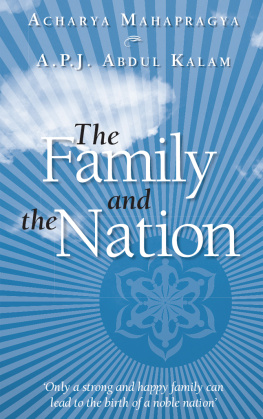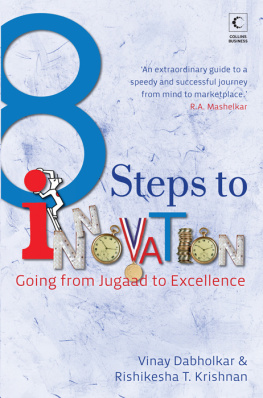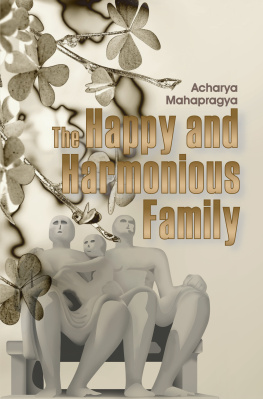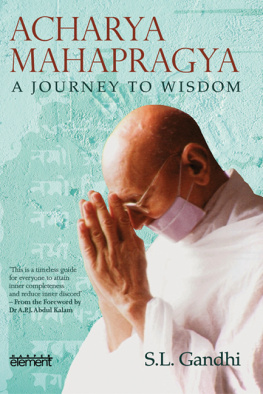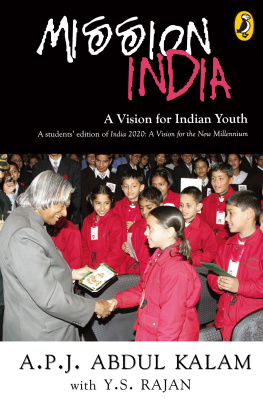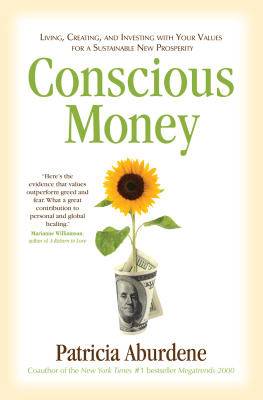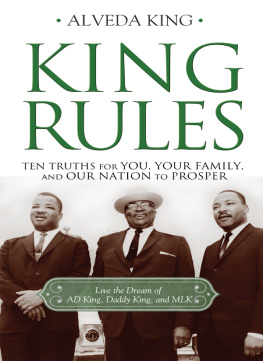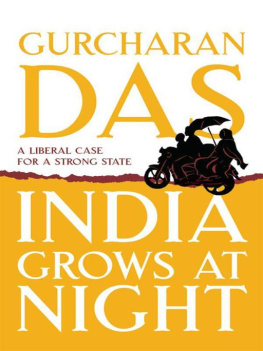
The Family and the Nation
A CHARYA M AHAPRAGYA

A.P.J A BDUL K ALAM

Contents

A charya Mahapragya is a fount of knowledge who purifies every soul that comes into contact with him. My first experience with him was at the Adhyatma Sadhna Kendra, Mehrauli, in October 1999. It was around midnight, and Acharyaji had prayed three times with his distinguished Jain monks for the welfare of the nation and the people. After the prayers, he turned to me and said words that still reverberate in my mind. He said, Kalam, God bless you for what you have done with your team. But the Almighty has a bigger mission for you and that is why you are here with me today. I know our country is a nuclear nation now. But your mission is greater than what you and your team have done; it is indeed greater than what any human being has ever done. Nuclear weapons are proliferating in tens and thousands in the world. I command you and you only with all the divine blessings at my disposal to evolve a system of peace wherein these very nuclear weapons will be ineffective, insignificant and politically inconsequential.
When Acharyaji finished his message, a hush fell over the hall. It appeared to me as though the confluence of heavens concurred with the saintly message. For the first time in my life I felt shaken. Since then, Acharyajis message has become my guiding light, and making it a reality a challenge that has given a new meaning to my life.
After that meeting, I met Acharya Mahapragya a number of times, and all my meetings with him gave me the distinct feeling that our conversations must have a higher purpose and that it must make itself manifest in some way. However, at that time, I did not know how that would happen. On 2 August 2005, I met Acharya Mahapragya again on the occasion of the conferment of the National Communal Harmony Award on him. We were seated together, and Acharayaji said, Kalam, the time has come to translate our thoughts into actiondeveloping a peaceful, happy and prosperous society through the development of the family and the nation. And this we will do in the form of a book. We thought over the question of how a noble nation could be formed and came to the conclusion that its seeds need to be sown in the family. Only an individual who has been brought up in a family that instils the right values will be able to realize his or her responsibility towards the nation. Such a citizen will adopt the principle work with integrity and succeed with integrity. This premise is the bedrock of the book, which is why we have named it The Family and the Nation .
NOBLE NATION
A beautiful and yet distinct
Reddish light engulfed the galaxy,
The Milky Way, our galaxy.
All the stars were surprised with the alarm,
Wherefrom this lovely powerful light,
Who emanates, who emanates,
That was the cry of the galaxy.
I will answer, my friends:
Oh my galaxy friends, I am the Sun,
I have eight planets in orbit,
One of them is Earth,
Carries six billion human lives.
They live in hundreds of nations.
One of the nations with great civilization,
India 2020, celebrates the birth of the noble nation.
Light of celebration from India reaching our galaxy,
Nation with clean environment without pollution,
Having prosperity without poverty,
Peace without fear of war,
The happiest place to live.
A.P.J. Abdul Kalam
Part 1

The Evolution
1
The Dynamics of Indian Culture

The human being is his own salvation,
and that is through three jewels:
Right Faith, Right Knowledge
and Right Conduct.
Lord Mahavira
I ndia is changing and a new nation is emerging before the eyes of the world so swiftly, so palpably that we can all watch the process. Out of this awakening is arising a new Indian renaissance, which will determine its future. There are, of course, many problems the nation faces today. To deal with these problems in the light of the Indian spirit and with a greater synthesis of science and spirituality is a difficult task but it must be undertaken.
Indian civilization has been the form and expression of a culture as great as any in human historygreat in religion, philosophy and science, great in thought, great in literature, art and poetry, great in the organization of society and politics, great in craft and trade and commerce. Indeed, in what field has India not accomplished great things?
Indian culture has been enriched by extraordinary spiritual leaders, thinkers and saints. The values enshrined in the Vedas and the epicsthe Ramayana, the Upanishads, the Mahabharatacreated a deep impact on Indian literature and life. In Indian history, we see the convergence of many civilizations and cultures, which enriched India spiritually.
In mathematics, astronomy and chemistry, the chief ingredients of ancient science, Indians discovered and formulated much and anticipated, by reasoning or experiment, some of the scientific ideas and discoveries which Europe arrived at much later. India was well-equipped in surgery and her system of medicine survives to this day, though it declined intermediately in knowledge and is only now recovering its vitality.
Culture is a powerful human tool for survival, but it is also a very fragile phenomenon. It is constantly changing and is easily lost because it exists only in our minds. There are many layers of culture that are part of our enlightened behaviour patterns and perceptions. Most obviously it is the body of cultural traditions that distinguishes a specific society. When we speak of Indian culture, we are referring to the shared languages, traditions, and beliefs that set one group of people apart from others. In most cases, those who share a culture do so because they acquired it as part of their upbringing by parents and other family members. This chapter takes a long view of the evolution of Indian culture starting from the advent of human civilization.
THE INDIAN CULTURE
Indian society is multifaceted to an extent perhaps unknown in any other of the worlds great civilizations. Virtually no generalization made about Indian society is valid for all of the nations multifarious groups. Comprehending the complexities of Indias social structure has challenged scholars and other observers over various periods of time.
The culture of India has been shaped by its long history, its unique geography, its absorption of customs, traditions and ideas from some of its neighbours, as well as by preserving its ancient heritage from the Indus Valley Civilization onward. India was repeatedly invaded across its land borders from Europe, West Asia and Central Asia and occupied in three waves for about 1325 years. Then the fourth wave arrived from across the seas with the British and other European powers, and lasted 227 years. This fusion of multiple cultures and civilizations is the unique character of Indian civilization. Living within the embrace of the Indian nation are vast numbers of different regional, social, and economic groups, each with different cultural practices. It is important to trace how Indian culture evolved.
As the people left their original forest dwellings to come to villages and towns, new social, economic and governmental systems developed, sowing the seeds of what came to be termed as a culture. Cities started becoming larger and more sophisticated, and people migrated out of villages and farms and flocked to the urban centres to take up various occupations which were no more dependent on Nature or handicraft but on fellow human beings and their interests.
Next page
